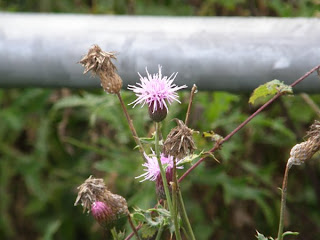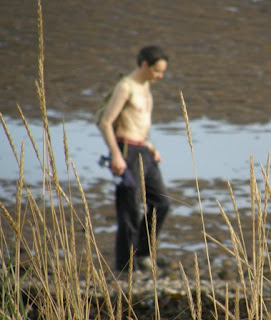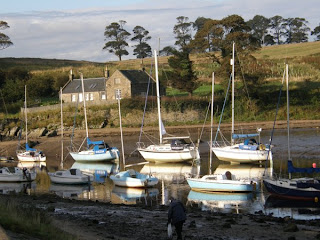Sunday morning is time for a last leisurely look at Edinburgh before heading back south to connect with a 9.30pm flight out of London Heathrow. Not content to sit home with the olds and eat whatever is on offer for breakfast, I opt for some exercise before the long train and plane trip back to NZ. For a bit of self indulgence, I head down to the waterfront close by where I lived as a child. I learned to swim here, in what I later identified as a sewer outlet, had many adventures along the river walk and imagined many more on the causeway out to Cramond Island. Access to the island is at low tide only as the walkway is covered from about half tide onwards. I saw the most amazing bright green and black zig zag skinned lizard like creature in the water here once upon a time. Stories of overnight strandings, real or imagined, buzzed in fertile childhood imaginations, becoming bigger and wilder in the process.
The lasting memory is of pristine skies with an occasional tanker moving silently up the Firth of Forth, past the city, to the oil refinery at Grangemouth. Now a rancid, tobacco colored streak of industrial haze lines the horizon, a queue of tankers waits to load or unload at offshore pontoons, an idle oil rig lazes on a mooring and a thick column of smoke rises behind the island from some unseen industrial site. Hence the title of this post, 'lang may yer lum reek' – this is actually a wish for warmth and prosperity in the Scottish household, for if yer lum reeks (ie your chimney smokes) it means you have warmth, and by implication, the wealth to sustain it. The 'lang' part is probably self explanatory, even to non-native speakers.


The city may show all the signs of affluence, but clearly there is a cost.
The tide is out on this otherwise fine sunny morning, and so are a number of people, making the most of the glorious weather after a summer that didn't really happen. An unfortunately common problem in Scotland. Autumn comes on the tail of three short months of wet, cold, windy and only slightly warmer than spring months. Autumn is usually a lovely time, the weather calm with nature showing a few spots of color before the cold and frost of short winter days turn everything to brown and gray.


A lady sitting on the sea wall with a small dog on her lap, both enjoying the lukewarm sun, tells passers by that the old dog can't walk any further but doesn't want to go home yet. Who is that doesn't want to go I wonder? A young man walks on the beach stripped to the waist, his torso the painful purple / white color I have only ever seen on beaches in Scotland where bodies never see the sun.


Time is short, so I hurry back to where I left the car in old Cramond village. I've known this place for most of 50 years and realize that for all the history of Scotland I've learned in recent years, I still don't know the origins of this unique and lovely place with its whitewashed houses, old mill, ferryman crossing and ancient church and graveyard. Perhaps another time.



 The Tower Hotel, another of the oldest buildings in the area.
The Tower Hotel, another of the oldest buildings in the area. The Kings Wark, a former royal supply base has been a pub as long as I can remember. Known as 'The Jungle' in my younger days, it was the haunt of sailors ad call girls repeated in every sea port round the country. Seems its undergoing yet another renovation.
The Kings Wark, a former royal supply base has been a pub as long as I can remember. Known as 'The Jungle' in my younger days, it was the haunt of sailors ad call girls repeated in every sea port round the country. Seems its undergoing yet another renovation. A mix of old, new and the best / my all time favorite wine bar and restaurant The Shore Bar. Limitations on space - or maybe just aesthetics - has produced creative options for offices and restaurants on the water.
A mix of old, new and the best / my all time favorite wine bar and restaurant The Shore Bar. Limitations on space - or maybe just aesthetics - has produced creative options for offices and restaurants on the water.
 This one really is the parting shot from my home city - waiting for the train south from Waverley Station.
This one really is the parting shot from my home city - waiting for the train south from Waverley Station. 





















































